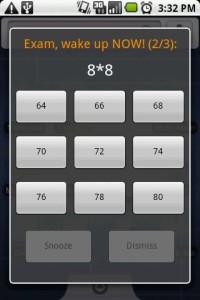Maths Alarm Clock: A Tool That Is Much More Than Meets the Eye
 Unfortunately, we’ve all been there: the gruel of exam week is upon you. Belk Library is brimming with students poring over textbooks and laptops. The air reeks of sweat, Acorn coffee, and test anxiety. And you’ve just finished studying at 4 a.m. After trudging accross campus to the comfort of your warm bed, a spark of panic flares up when you realize you’re only set up for about three and a half hours of sleep before your 8 a.m. final. And there’s no way that after cramming since dinner time and barely seizing the chance to close your eyes, you’ll be as alert as possible for this test. Failure looms dauntingly on the horizon.
Unfortunately, we’ve all been there: the gruel of exam week is upon you. Belk Library is brimming with students poring over textbooks and laptops. The air reeks of sweat, Acorn coffee, and test anxiety. And you’ve just finished studying at 4 a.m. After trudging accross campus to the comfort of your warm bed, a spark of panic flares up when you realize you’re only set up for about three and a half hours of sleep before your 8 a.m. final. And there’s no way that after cramming since dinner time and barely seizing the chance to close your eyes, you’ll be as alert as possible for this test. Failure looms dauntingly on the horizon.
I have a lot of personal experience with this feeling–honestly, more than I care to admit. And I am a deep, deep sleeper, to the point that my roommates think I may never rise from the grasps of slumber again. There’s nothing worse than starting the day hazy, with the fog of tiredness in your eyes, especially during the critical finals week. This presents a puzzling challenge, because the more tests we have, the more we study. The more we study, the later we must stay awake. The later we’re up and at ‘em, the less likely we are to perform on our morning exams. Fall semester, I embarked on a quest to break the chains of this vicious cycle. Little did I know, a profound solution could be found in the simplicity of an app.
Maths Alarm Clock, created in 2012 by Dysign Web Services, changed my mornings in a way I didn’t expect. While it functions as a normal alarm in every way, it also generates a simple math problem which the user must solve before the alarm will cease. For someone who has a hopeless addiction to the snooze button, “Maths Alarm Clock” solves the problem of drowsiness and anger stunting my morning routine. Funnily enough, thinking through a simple math problem bright and early makes it very difficult to fall back asleep.
Curious about the implications of waking your brain with a little math, I decided to do some research. I reached out to Dr. Amy Overman, a professor of cognitive neuroscience at Elon. Immediately, she directed me to take a look at Science Daily, where I made some interesting finds on the topic.
“The biological clock ramps up our metabolism early each day, initiating important physiological functions that tell our bodies that it’s time to rise and shine,” explains an article from The Salk Institute. “The alarm signal during deep sleep is stressful and familiar to everyone. But this can avoided.”
It may seem like you’re giving yourself a few extra minutes to collect your thoughts [when you hit snooze]. But what you’re actually doing is making the wake-up process more difficult and drawn out. If you manage to drift off again, you are likely plunging your brain back into the beginning of the sleep cycle, which is the worst point to be woken up,” writes Maria Konnikova, a psychological journalist.
But it’s crazy the number of benefits you can glean from challenging your brain in the morning. Some researchers say that completing math problems, Sudoku puzzles, or crosswords prime your brain to perform at higher levels of activity throughout the day. Others still claim that exercising the brain can temporarily improve short-term memory. All of them hold steadfastly to the claim that math works your brain waves in a way that can have a profound effect on mental quickness and dexterity that can only benefit your productivity throughout the day. And it’s that kind of vigilance the minds of college students are thirsty for just before exams.
So, here’s my advice to the Elon community as exams are fast approaching. Search and download Maths Alarm Clock. And next time you have a test at the crack of dawn, don’t hit the snooze button, don’t shock your brain cells with coffee, don’t content yourself with being tired. Give your brain a healthy workout with a little mental action, and wake yourself up right.
 Follow
Follow